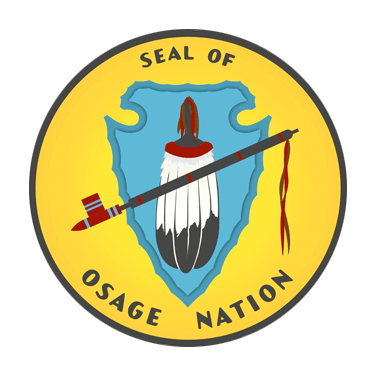ABOUT US
Today the Osage Nation uses revenues from its casinos to:
- Fund tribal government and programs
- Provide for the general welfare of the tribe and its members
- Promote tribal economic development
- Support charitable organizations
- Help fund operations of local government agencies of the Osage Nation
For information about the Osage Nation visit osagenation-nsn.gov

Who is the Osage Nation
The Osage Nation has a strong historical connection to Missouri, as can be recognized by the use of Osage in city, educational and business names, throughout the Lake area. At one time, the Osage (Wahzhazhe) had established villages in central and western Missouri that enjoyed the abundant resources and vast hunting grounds. Osage villages, camps, trails and sacred sites, which include rock art and burials in caves, bluffs and underground, are throughout the landscape within our ancestral territory in Missouri. With the Louisiana Purchase forcing eastern tribes to the west, the Osage began a series of treaties, which ultimately led to the purchase of our final and permanent home in Oklahoma. The Osage Nation has a constitutional form of government with three branches, like the United States and Missouri Constitution, where our executive and legislative office holders are elected. We enjoy an independent judiciary. The Nation provides educational, health care, housing, and nutritional support to our members. We fund these programs largely with revenues from our federal congressionally authorized tribal gaming operated by our government. Federal law requires that our net gaming revenues are for tribal support, non-tribal government support and charity. We do not distribute gaming revenues to our members as a dividend or per capita payment.
What do Osage Casinos do
We are not a start-up. We have decades of operational experience. As the owners of tribal government gaming, we are not subject to being bought out. We currently operate seven casinos in Oklahoma, of which three are attached to hotels. We employ 1300 people at our casinos, with only 10% being members of the Osage Nation. We pay payroll taxes on those employees, including Social Security, Medicare, and federal and state tax withholding.
Perhaps most important to the Lake of the Ozarks from a tax revenue perspective, on average, 90% of the workforce employed at similar facilities operated by Osage Nation are non-tribal members, creating new employment opportunities and growing tax revenue for the local community.
Our employees, who comprise a dedicated, high-quality workforce, enjoy competitive wages and salaries, a bonus program, educational benefits, superior health insurance, and a 401(k) plan. We proudly invest in our workforce by focusing on internal development and promotion.
How are Osage Casinos Regulated
Our gaming operations are highly regulated both by tribal and federal gaming regulators. All employees involved with gaming are licensed. Gaming management personnel license applications are reviewed by the federal government. Our casinos are audited by an independent CPA, who is selected by the gaming regulators and the audit reports are provided to the federal and Osage governments. Our gaming ordinances, enacted by our Congress and Chief that control our casinos, are expressly approved by the chairman of the federally established National Indian Gaming Commission. Federal law requires us to follow the internal control standards established by the Commission. Our compliance is audited annually. All of our facilities are licensed by the regulators. To date, there have been no regulatory issues concerning the operation of our gaming by our federal and tribal regulators.
Our odds and payout rates are reviewed by our regulators and are proven to be more favorable to players than most commercial for-profit gambling operations.
Are Osage Casinos Successful
Not only are we sound from a regulatory basis, but we are on sound financial footing. Osage Casinos have retired $130,000,000 of debt over the last 5 years, in addition funding a cash operating reserve that exceeds existing indebtedness. Unlike a commercial gaming operation, we have no investors that expect a for-profit dividend. The absence of those investors allows us to use our net gaming revenue for tribal programs and supporting the communities in which we operate.
How We Plans to Support the Lake Area
We plan on employing 120 local community members. Our jobs should pay between $35,000 and $150,000 per year, with attractive health, retirement, bonus, and educational benefits. Our anticipated payroll of $7 million annually will cause significant spending in the Lake Area.
As we move forward with our plans, we intend to work closely with local law enforcement, utility providers, and other service providers on cooperative agreements to pay all of the cost of service to our facility. We look forward to providing significant support to local schools and governmental programs.
Although we were in Missouri long before it was a state, we recognize we are not yet well known today to Missouri, the Lake of the Ozarks and its citizens. We hope to change that through cultural education initiatives and building strong community partnerships.
As the community continues to get to know the Osage Nation and our plans, we encourage you to contact the communities in which we operate. They are strong advocates for our reputation, local contributions, support for law enforcement, and community service. We are confident that you will hear the truth and be comfortable with what we are offering the Lake of the Ozarks.
In addition to supporting local governments, schools and charities, we plan to use revenue from the project to help further meet the educational and health care needs of our members.
Throughout my 14 years at Osage Casinos, I have seen firsthand the positive impacts we have in communities we serve and I look forward to a long and mutually beneficial relationship with the Lake of the Ozarks.
Kimberly Pearson
Chief Executive Officer - Osage Casinos

We've been helping communities increase revenue for more than 20 years.
WE ARE OSAGE NATION.
All Rights Reserved | Osage Casino